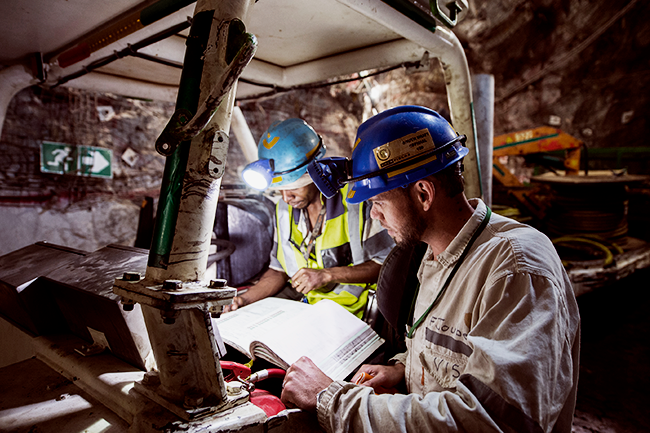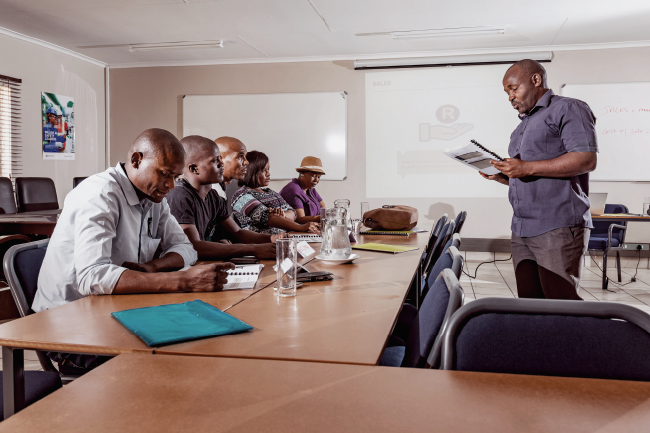South Africa faces a huge challenge of unemployment and poverty. And to deal with these factors effectively, there is general agreement that ‘the economy must create 5 million jobs by 2020 and 11 million jobs by 2030’, says Melanie Naidoo-Vermaak, Harmony executive for sustainable development. ‘At the centre of this growth is small business as the single-largest employer in the country.’
Within Harmony, SMEs take up a large percentage of the procurement spend, she says. In 2019, the company developed a preferential procurement strategy, aligning with several of its existing plans and procedures. ‘To foster integration and alignment between preferential procurement and enterprise and supplier development [ESD], we also created a strategy and framework that plans to increase the procurement spend for small businesses over the next three years,’ she says. ‘Our ESD process is designed to promote transformation of our supply chain for diversity of suppliers, sustainability of our operations and linkages in our community. Enterprise development plays a critical role in the creation of a pipeline to ensure that SMMEs are enabled to participate in procurement opportunities.’
Naidoo-Vermaak calls SMEs ‘integral’ to Harmony’s social impact, as it is through this sector that the company can assist and contribute to local economic development, particularly with regard to employment. There is added benefit where the growth of SMEs can be seen and measured, she says, including value added to products used in Harmony’s operations, and a contribution to innovation and inclusive growth. ‘We also intend to support the building up of systemic productive capacities and the creation of resilient economic systems, through linkages between small and large enterprises.’
Harmony recently introduced supplier-engagement workshops, or what it calls supplier days, which are held in its host communities for registered businesses. ‘As an enabler, Harmony shares the procurement calendar with these registered businesses, including information on upcoming procurement opportunities and on contracts that will be renewed within 12 months,’ says Naidoo-Vermaak. ‘These sessions further assist SMMEs to prepare their bid proposal packs for the upcoming opportunities.’

Harmony also has three ESD centres – in Welkom, Soweto and Matlosana – which offer small enterprises access to business support without the usually associated excessive costs. In the 2018 financial year, the ESD centres managed contracts of more than ZAR42 million with 100% black-owned companies.
Sibanye-Stillwater notes in its most recent integrated report that local procurement was a major cause of strained relationships with local communities during 2018. An important way for the miner to contribute to the economic development of surrounding communities is thus to increase participation by local businesses in its organisation. It is rolling out an intensified programme to unlock opportunities for local suppliers.
Procuring services from local suppliers remains a challenge for the mining giant, with a lack of relevant mining skills, pricing and contract deliveries among the difficulties faced. In response, the company has employed Phakamani Impact Capital, an enterprise development service provider and financier, to help nurture the skills required to support sustainable local suppliers. Sibanye-Stillwater’s ESD strategy includes proactively identifying SMEs and potential joint ventures, and establishing business centres across its operations. During 2018, 80 loans were approved to the value of ZAR12.9 million for the benefit of 44 SMEs, including 42 youth and 25 female entrepreneurs, and 593 jobs were sustained for the project and/or contract duration. In addition, 54 companies were mentored and trained, with Phakamani’s help.
‘When we’re no longer mining in an area, we want to leave behind a vibrant economy,’ says Exxaro Resources’ ESD programme manager, Lusapho Njenge. Enterprise walk-in centres have been made available at many of Exxaro’s mining locations for communities to inquire about business opportunities. These centres provide business training and support, hands-on mentoring and coaching. Support is also available to assist with compiling proposals and budgeting.
Two centres proving quite successful are at Exxaro’s Delmas and Belfast operations, where entrepreneurs are receiving business acumen training, personalised mentoring, business support and help gaining access to business funding. The Grootegeluk coal mine in Limpopo contributed ZAR3.55 million over four years towards the operation of the Lephalale Enterprise Development Centre, where 25 SMEs participate in the incubation process. A rural entrepreneurship-development programme benefiting 80 people has also been implemented at Exxaro’s operations in Belfast and Lephalale. During 2018, Exxaro invested ZAR5 million into ESD.
The company’s efforts have not gone unnoticed. In May 2019, at the Absa Business Day Supplier Development Awards, which recognise supplier-development best practice in South Africa, Exxaro received the Newcomer Award – an accolade recognising companies that have implemented new supplier-development initiatives and shown merit in innovation and commitment.
In late November 2019, Exxaro and Barloworld Equipment signed an MOU affording contractors access to the required mining equipment at competitive rates and terms, in addition to post-acquisition support so that they might execute operational projects. This is because in the past, it was found that many contractors awarded projects lacked the means to purchase or lease the equipment required to execute the work. Exxaro intends to explore similar partnerships with Komatsu, Volvo, Bell and a few others.
As far as its supply chain goes, during 2019, Sasol’s expenditure with black-owned enterprises increased to ZAR19.2 billion, according to its 2019 sustainability report, while its spend with black woman-owned businesses increased to ZAR13.1 billion. The company intends to allocate more work to black-owned suppliers, it states, as well as assist with coaching, mentoring and training.

Through its ESD trust, the Sasol Siyakha programme, Sasol invested ZAR204 million in loans to SMEs. The company focuses its efforts on entrepreneurial awareness and training, business incubation and enablement, and funding – which it does through the trust. Some of Sasol’s key successes in bolstering small business include graduating six SMEs from fence-line communities; helping 31 incubates, most of whom participated in the Sasol Business Incubator; providing almost 150 hours of mentorship and coaching support to SMEs; and training at least 80 farmers in South Africa and Mozambique on sustainable food production. Thinking of the future, Sasol also focuses on youth entrepreneurship, putting 300 youth entrepreneurs through training in business education.
‘It’s important for large organisations to support SMEs because we’ve got the spending power,’ says Vusi Maseko, supply chain GM at Kumba Iron Ore. ‘Sure, we could trade with other big companies, but that won’t help with societal needs like lack of development and employment in the areas where we work. By involving smaller businesses, we are touching more lives.’ As a large, global company, Anglo American could procure wherever it sees fit. However, says Maseko, it has instead placed a special focus on procuring from its host communities. ‘We’ve got six municipalities around our two mines in the Northern Cape and we try to work with as many small enterprises as we can from these areas. Because we’re located in such far-flung rural settings where there is a lot of poverty and little development, helping grow small businesses is our way of saying “we are here”. We like to ensure the communities around us also benefit.’
According to Maseko, the company has more than 1 500 suppliers, 318 of which are host community-based SMEs. A few years ago, this number was just 62, he says. ‘Our target was to spend ZAR2 billion this year with host communities,’ he says. ‘We have exceeded that with ZAR2.2 billion. Last year, we set a target of ZAR1 billion and spent ZAR1.4 billion. There’s been growth in the number of SMEs with which we work and the business that we do with those SMEs.’
Achieving such targets has meant cross-functional teams have worked diligently to put in place policies, processes and procedures to support supplier verification, due diligence on BEE deals, and revising clauses in contracts relating to BEE ownership, he adds.
Kumba also collaborated with business forums within the host communities, which led to the establishment of the Gamagara Corridor Chamber of Commerce and Industry. It is believed to be the first and only example in the country of host community business forums forming a chamber, which allows them to better engage strategically with other mining companies in the region.
Maseko emphasises the importance of boosting small, local businesses. ‘The areas where we find ourselves and our businesses are isolated areas exempt from the mainstream of the economy. So, unless we actually change our model of doing business, those people will see us coming and see us going, and their lives will remain unchanged,’ he says.
‘By modifying our operating model and involving them in our business, we create meaningful coexistence, and can start measuring the direct benefit that those communities receive. I would like to see more small enterprises growing and becoming sustainable, and see more market opportunities open up for them.’








